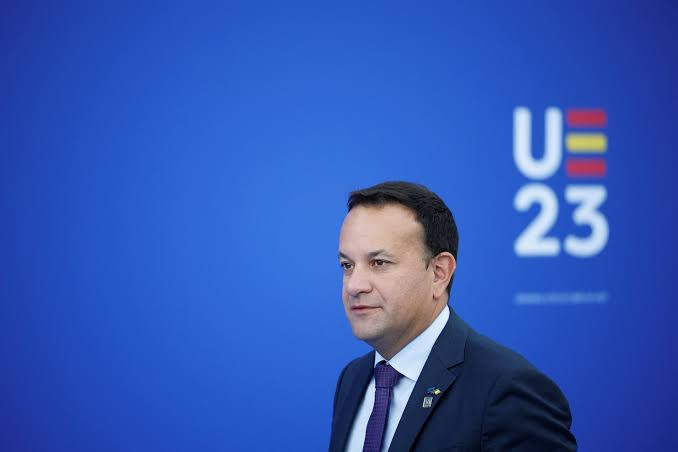Ireland’s newly appointed Prime Minister, Taoiseach Simon Harris, has accused Israel of replacing reason with revenge in recent tensions between the Israeli and Irish governments. In his first television interview since taking office, Harris responded to criticisms from the Israeli Foreign Ministry and the Israeli Ambassador to Ireland, Dana Erlich. He stated that Israel’s actions in allowing the humanitarian catastrophe in Gaza to unfold, affecting women, children, civilians, and infrastructure, are profound. Harris emphasized Ireland’s condemnation of Hamas and its recognition of Israel’s right to live in safety and security. However, he believes that reason has been replaced by revenge in the current situation.
Harris called for an immediate cessation of hostilities in Gaza and plans to persuade fellow European Union leaders to formally recognize the state of Palestine. He believes that a peaceful solution to the war in Gaza requires like-minded countries to come together and recognize Palestine. Harris reiterated Ireland’s readiness to recognize the state of Palestine and its eagerness to do so alongside other EU member states to generate positive momentum.
The Israeli Foreign Ministry has condemned Ireland’s intention to recognize Palestinian statehood, arguing that it would reward Hamas with a “prize for terrorism.” However, Harris firmly believes that recognizing Palestine as a state is a necessary step towards achieving a just and lasting peace in the region. He argues that the international community must not turn a blind eye to the suffering of the Palestinian people and that recognizing their right to self-determination is a fundamental principle of justice and human rights.
Furthermore, Harris stressed that Ireland’s stance is not anti-Israel but rather pro-peace. He acknowledges the historical complexities and sensitivities surrounding the Israeli-Palestinian conflict and understands the legitimate security concerns of the Israeli people. However, he firmly believes that the current approach of relying solely on military force and punitive measures has proven to be ineffective in bringing about a lasting resolution.
Harris’s strong stance on the Israeli-Palestinian conflict has garnered both praise and criticism. Supporters applaud his commitment to justice and his willingness to speak out against what he sees as unjust actions by the Israeli government. They see his call for recognition of Palestine as a courageous move that could potentially pave the way for a negotiated settlement.
On the other hand, critics argue that Harris’s position is one-sided and fails to take into account the complexity of the situation. They argue that recognizing Palestine without addressing the security concerns of Israel could further escalate tensions and hinder the peace process. They also question the timing of Ireland’s intention to recognize Palestinian statehood, suggesting that it may be more politically motivated than driven by genuine concern for the well-being of the Palestinian people.
As the debate continues, it remains to be seen whether Harris’s call for recognition of Palestine will gain traction among other EU member states. The Israeli government, for its part, is likely to continue its opposition to such a move, arguing that it undermines the prospects for a negotiated settlement and rewards terrorism. In the meantime, the people of Gaza continue to suffer, caught in the crossfire of a conflict that shows no signs of abating. The recent Israeli airstrikes in southern Lebanon have intensified the already tense situation between Israel and Hezbollah. The Israel Defense Forces (IDF) confirmed that their airstrikes resulted in the deaths of three Hezbollah fighters, including two high-ranking commanders. One of the commanders killed was Muhammad Hussein Shahouri, who held a crucial position as the commander of the rockets and missiles unit of Radwan Forces’ western region.
Shahouri was known for his involvement in planning and promoting rocket and missile launches from Lebanon’s central and western regions towards Israeli territory. His death is a significant blow to Hezbollah’s capabilities in this regard. Additionally, Mahmoud Ibrahim Fadlallah, another operative of Hezbollah’s rockets and missiles unit, was also killed in the same airstrike. The loss of these two commanders will undoubtedly impact Hezbollah’s operational effectiveness.
In a separate incident, Ismail Yusaf Baz, the commander of Hezbollah’s coastal sector, was killed in the area of Ain Ebel in southern Lebanon. This development further adds to the escalating tensions between Israel and Hezbollah. The IDF’s targeted strikes on these high-profile Hezbollah figures demonstrate Israel’s determination to neutralize the group’s leadership and disrupt their military activities.
Hezbollah has acknowledged the deaths of its fighters but has provided limited details. This lack of information suggests that the group may be trying to downplay the extent of its losses. Nevertheless, these recent events highlight the ongoing volatility in the region and the potential for further escalation.
The international community is closely monitoring the evolving dynamics between Israel, Iran, and other actors involved in the conflict. The Israeli airstrikes in Lebanon have raised concerns about the potential for a wider conflict and the impact it could have on regional stability. Efforts are being made to de-escalate tensions and encourage dialogue between the parties involved. However, the situation remains highly unpredictable, and any miscalculation or provocation could lead to a dangerous escalation of hostilities.

